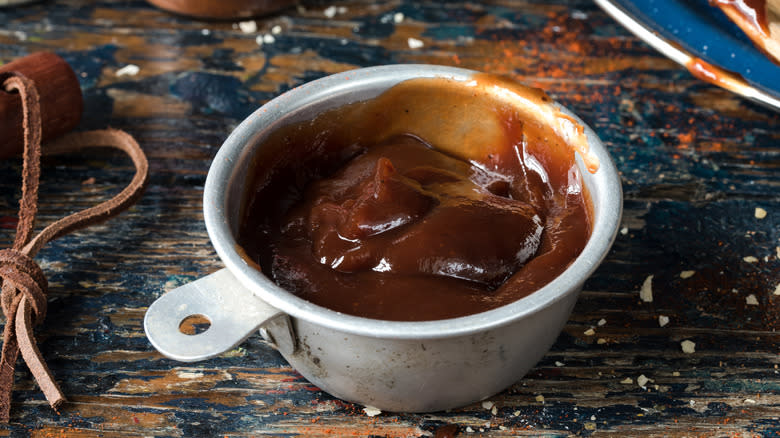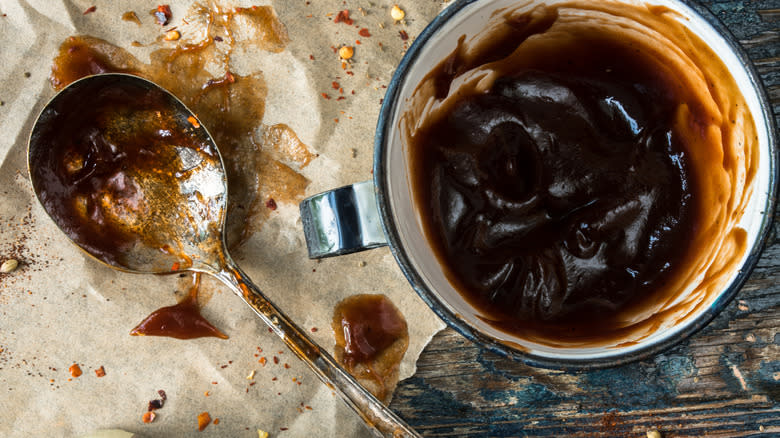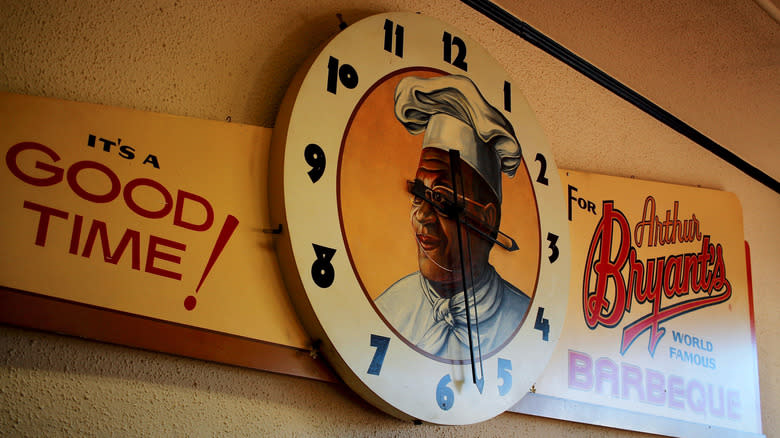What Makes Kansas City BBQ Sauce Stand Out From The Rest?

We may receive a commission on purchases made from links.
Lavishly brushed across ribs, imparting tender smoky notes in a marinade, or perfectly placed next to chicken wings. Barbecue sauce is effortlessly tangy, rich, and sticky -- yet it's also exceptionally adaptable. This is made apparent in the incredible range of regional barbecue sauce varieties available throughout the United States. However, among these celebrated variations, one stands out: the Kansas City barbecue sauce.
The Kansas City barbecue scene is legendary, with unique dry rub blends, a vast selection of meat cuts, and crispy to-die-for burnt ends. Its barbecue sauce is also on its list of accolades, as it hits a beautiful balance between tangy, sweet, and fiery flavors while retaining a thick but bright disposition. Unlike typical barbecue sauce recipes with murmuring sweet undertones from honey or brown sugar, the Kansas City variety delivers a decisively sweet punch. This unique flavor typically comes from a blend of ketchup and molasses, which contributes to the sauce's depth and distinctiveness.
Other ingredients add to the truly original nature of this barbecue sauce, coupled with a rich history that elevates this Kansas City barbecue sauce beyond a mere condiment.
Read more: The 15 Best Store-Bought Barbecue Sauces, Ranked
What Makes This Sauce Truly Unique?

The molasses can't take all the stand-out credit, as a Kansas City barbecue sauce also heralds its distinctiveness by incorporating other ingredients. For one, crushed tomatoes are usually added to the base, which, in turn, accentuates the body, richness, and acidity of the sauce. In contrast to other tomato-based barbecue sauces that rely solely on ketchup or tomato paste, such as a mop sauce, the incorporation of crushed tomatoes brings a recognizable thickness to this sauce, equally setting it apart.
While the sweet and thick nature of Kansas City barbecue sauce is its trademark, many varieties tend to deliver a spicy kick, too, albeit in a slightly different fashion. Instead of using earthy mustard, which is commonly found in the Memphis or South Carolina barbecue variations, Kansas tends to see raw hot flavors from heated chili powder, freshly cracked black pepper, a sweetly-spiced cayenne pepper, smoky paprika, or fiery chili flakes. In some instances, a mixture will be used to give a real poignant kick.
Where It All Began

Kansas City is regarded as a first-class barbecue destination, and that is strongly believed to be down to one particular man: Henry Perry. From his humble beginnings at a stall in the Garment District -- where the menu included raccoon and possum -- to his legacy living on long after his passing in the form of the famous Arthur Bryant's, Perry's influence on barbecue in Kansas is unquestionable. However, his barbecue sauce was remembered as being exceptionally heavy with pepper. So, how did it become the gloriously sticky condiment we know today?
Legend has it that Arthur Bryant began to incorporate molasses into the sauce after Perry passed on the secret recipe to him, but its popularity gained momentum in the 1970s when KC Masterpiece began to mass-produce the molasses-rich barbecue sauce. Yet, there's also an acknowledgment that the sauce has gradually grown sweeter over the years to align with our increased desire for sweetness. There's little room for complaint when a sweetened barbecue sauce such as this can be utilized as a dip or baste for juicy chicken or alongside tender smoked beef brisket. Although, there is one cut that is particularly elevated with this prized sauce: pork ribs.
There's a lot to be said for barbecue sauce, but the Kansas City variety is particularly noteworthy. Its thick, syrupy texture and sweet yet spicy complexity have set it apart in a league of its own.
Read the original article on Daily Meal.

